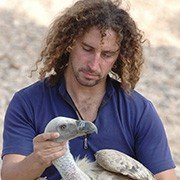Orr Spiegel has recently joined the School of Zoology (summer 2018). He studies movement ecology and animal behavior, in particular the importance of individual variation. Orr completed his graduate studies at the Hebrew University of Jerusalem and continued to postdoc studies at the University of California, Davis (4 years), and Ben Gurion university of the Negev (1 year). For his B.Sc. he combined Life and Earth Sciences (Geology) and during his M.Sc. he studied seed dispersal by desert passerines. His Ph.D. focused on foraging movements of vultures in Israel and Namibia and for his postdoc he tracked sleepy lizards in Australia and Nubian Ibex in the Judean desert, Israel. His lab investigates what are the ultimate and proximate factors that shape animal behavior and movement, and how the emerging movement patterns drive ecological and evolutionary dynamics.
Prof. Orr Spiegel

Biography
CV
Please see full CV here.
Research Interests
The overarching goal of our lab is to explore the socio-ecological factors that affect animal space-use, and the consequences of these movements for the fitness of individuals, population dynamics, the roles species take within their ecosystem as well as for their conservation. Movement integrates animals’ response to their environment across a wide range of spatial and temporal scales, ranging from day-to-day local foraging to once-in-a-lifetime, cross-continental dispersal events. Recent empirical and theoretical studies suggest that individuals differ consistently in their movements and this notion can facilitate progress in various topics, including basic and applied (conservation) sciences.
More broadly, Understanding the patterns and mechanisms of movement decisions is a long lasting challenge in ecology and evolutionary biology with implications for many processes at the population level such as social networks, disease dynamics, colonization, optimal foraging as well as for animals response to habitat fragmentation and conservation of natural systems. Yet, many of the models and concepts in these diverse disciplines use oversimplified representation of movement (e.g., assuming it to be random when it is clearly structured, or ignoring constraints- e.g., the ideal free distribution). Therefore, we believe that studies of movement ecology will provide potential insights into many of these processes and to our ability to model them better.
Recent Publication
Last updated March 2018, for updates please visit our website here
2018:
Dougherty E. R.†, Seidel D. P.†, Carlson C J., Spiegel O., and Getz W. M. (2018). Going through the motions: incorporating movement analyses into disease research. †Equal contribution. Ecology Letters. 21, 588–604
Tucker et al….Spiegel, O (I’m among many authors by alphabetical order)…. & Mueller, T. (2018). Moving in the Anthropocene: Global reductions in terrestrial mammalian movements. Science. 359(6374):466-469
Spiegel O., Sih A., Leu S. T., & Bull C. M. (2018). Where should we meet? Mapping social network interactions of sleepy lizards shows sex-dependent social network structure. Animal Behaviour. 136, 207-215 (A special feature on social networks).
Sih A., Spiegel O., Godfrey, S.S., Leu S. T., & Bull C. M. (2018). Integrating social networks, animal personalities, movement ecology and parasites: a framework with examples from a lizard. Animal Behaviour. 136, 195-205 (A special feature on social networks).
2017:
C. M. Bull, Gardner M. G., Sih A., Spiegel O., Godfrey S.S. & Leu S. T. (2017). Why is social behavior rare in reptiles? Lessons from sleepy lizards. Advances in the Study of Behavior. 49, 1-26.
Harel, R., Spiegel O., Getz W. M. & Nathan R. (2017). Social foraging and individual consistency in following behaviour: testing the information centre hypothesis in free-ranging vultures. Proceedings of the Royal Society B. 284 (1852), 20162654
Spiegel O., Leu S. T., Bull C. M. & Sih A. (2017). Movement ecology as a link between animal personalities and their populations’ spatial dynamics. Ecology Letters. 20, 3–18.
2016:
Spiegel O. & Crofoot, M. (2016). The feedback between where we go and what we know – Information shapes movement, but movement also impacts information acquisition. Current Opinion in Behavioral Sciences (invited contribution for a special feature on behavioral ecology). 12, 90–96.
Harel, R., Duriez O., Spiegel O., Fluhr J., Horvitz N., Getz W. M., Bouten W., Sarrazin F., Hatzofe O. & Nathan R. (2016). Decision-making by a soaring bird: time, energy and risk considerations at different spatio-temporal scales. Philosophical Transactions of the Royal Society of London, 371, 20150397.
Spiegel O., Leu S. T., Bull C. M. & Sih A. (2016). Socially interacting or indifferent neighbours? Randomization of movement paths to tease apart social preference and spatial constraints. Methods Ecology and Evolution. 7(8), 971–979.
2015:
Spiegel O., Leu S. T., Sih A., Godfrey S. S. & Bull C. M. (2015). When the going gets tough: behavioural type-dependent space use in the sleepy lizard changes as the season dries. Proceedings of the Royal Society B. 282, 20151768
Farine D. R.†, Montiglio P-O.† & Spiegel O†. (2015). From individuals to group and back: the selective consequences of group phenotypic composition. Trends in Ecology and Evolution. 30(10), 609-621. †Equal contribution, Alphabetical order.
Wey T., Spiegel O., Montiglio P-O. & Mabry K. (2015). Natal dispersal in a social landscape: considering individual behavioral phenotypes and social environment in dispersal ecology. Current Zoology. 61(3), 543 - 556. (Included in the special issue: ‘Individual variation and dispersal ecology in dynamic environments’).
Spiegel O., Harel R., Centeno-Cuadros A., Hatzofe O., Getz W. M. & Nathan R. (2015). Moving beyond curve-fitting: using complementary data to assess alternative explanations for long movements of three vulture species. The American Naturalist. 185(2), E00-E11.
For publications before 2015 please visit our website here

